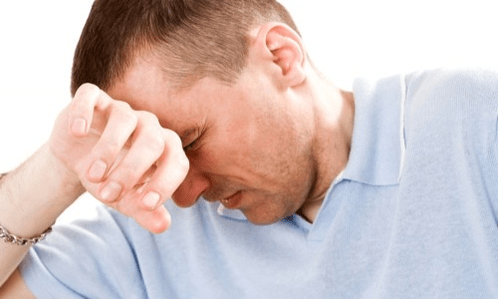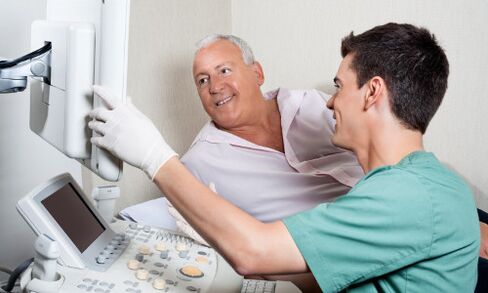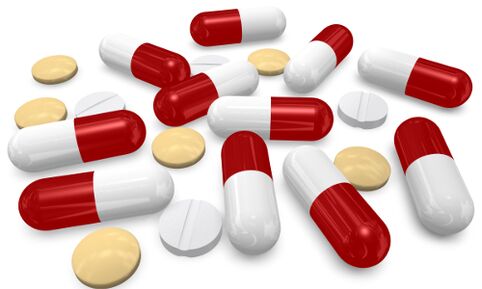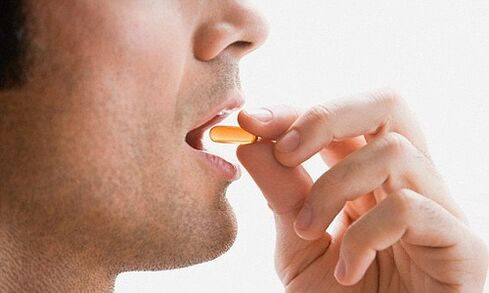Nowadays, the treatment of prostatitis is a big problem for doctors around the world because the disease is complex and insidious.

Prostatitis can only affect the stronger sex, although some may not even know which doctor is treating prostatitis until a certain point.
Regardless of age, if a man is worried about discomfort or if there are similar signs, you should immediately contact a specialist.With timely contact with a medical institution, the treatment of prostatitis in men does not present any difficulties.
Types of prostatitis and their signs
Based on the area of the disease, prostatitis can be divided into 2 main types:
- Infection of the prostate in men, which guarantees the course of the disease mainly in the pelvic area.
- Congestive prostatitis, which directly affects the prostate.
The forms of the course of the disease can be of 3 types:
- chronic bacteria (treated with physiotherapy and symptomatic therapy);
- chronic abacterial (prostatitis is treated depending on the causes that caused it);
- Aggravation of a chronic form (treated with antibiotics).
The following factors can be seen as signs of the development of prostate disease in men:
- violation of urination;
- sexual dysfunction;
- sharp pains in the lower abdomen, scrotum;
- Discomfort in the perineum;
- Change in the amount of ejaculate.
Almost all forms of the disease occur predominantly without clinical symptoms, but with chronic prostatitis a long course of the disease is observed. Treatment of prostatitis should be prescribed only by a professional practicing urologist on the basis of the results of the passed tests.
All the nuances associated with acute clinical symptoms can be due to various factors, such as:
- how long a neglected disease lasts;
- the level of the inflammatory process;
- are there any pathologies in this area;
- Regularity of sexual activity.

Such questions are important, since the signs of the development of the disease are very similar to the occurrence of other diseases in this area.
Causes and Risk Factors
There are several main reasons for the development of such a disease:
- a sedentary lifestyle, mainly for managers and civil servants, some civil servants;
- dysfunction of the circulatory system;
- low immunity;
- constant stress and systematic psychological stress;
- frequent, severe hypothermia, especially in skiing and similar sports;
- prolonged lack of sexual activity;
- various sexually transmitted infections (mycoplasmosis, herpes, chlamydia, fungi, Trichomonas, Escherichia coli);
- violation of the hormonal background of the body;
- Lack of vitamins and minerals.

Symptoms of prostatitis
Most often the disease proceeds with pronounced symptoms, so it is not so difficult to notice it in time. The symptoms of the disease are as follows:
- violation of potency;
- Pain in the perineum;
- Discomfort in the anal area;
- frequent urination, accompanied by pain;
- Temperature rise;
- an increase in sweating.
In no case should you delay the treatment of the prostate in men, since prostatitis, in addition to various painful sensations, also reduces blood circulation in the genitals, which affects the ability of sperm to mature.
If a man shows any of the above symptoms, it may either be due to individual characteristics or the development of other diseases. When inflammation of the prostate develops in men, the symptoms often manifest and make each other worse.

In chronic diseases of the prostate, the symptoms are the same but less pronounced. However, the risk of the disease spilling over into a chronic form is that the condition will worsen sharply in moments of crisis. In addition to the main symptoms, the following can be added:
- a constant feeling of a full bladder;
- Discharge from the urethra when defecating;
- severe irritability;
- lack of orgasm.
The lack of timely correct treatment leads to the development of such complications:
- recurrent cystitis;
- Suppuration of the prostate (can only be corrected by surgery);
- Obstruction of the bladder;
- the development of infertility;
- Narrowing of the genitourinary canal;
- Impaired kidney function;
- Sepsis and complications that threaten life and health;
- Development of kidney failure.

Untreated prostatitis can lead to the following complications:
- Development of vesiculitis or inflammation in one or two seminal vesicles at the same time;
- Inflammation of the seminal tubercle;
- the formation of stones in the prostate.
One of the most unpleasant complications is prostate sclerosis, i. H. The disease has long been developing and assuming a certain degree of complexity, but the symptoms by which it can be identified appear much later. Therefore, it cannot be determined without a special medical examination.
Some advanced forms of the disease can lead to a complete lack of sex drive. Namely, with a deterioration in the work of receptors responsible for sex life and sexual arousal, there is a decrease in the level of hormones.
Modern diagnostics and treatment
This problem cannot be solved alone. So if any noticeable symptoms are noticed, it is worth contacting a urologist as soon as possible.
Drugs for treatment are different and are selected in accordance with the individual physiological characteristics of the patient.
Treatment for prostatitis should not be done at home alone.
Modern methods of treatment and diagnosis almost accurately determine the disease and the degree of its development.
Often the first thing a urologist prescribes for the treatment of prostatitis is a urinalysis on various samples, a bacteriological examination of urine and secretions of the prostate, which gives an accurate picture of the localization of a urinary tract infection.

In addition, it is very important to undergo a digital test of the prostate, which cannot be called particularly pleasant for a man, but is quite revealing for determining the disease. In some unclear cases, the urologist may instruct the patient to examine the enzymes of the prostate, ultrasound scans of the prostate and pelvic organs, as well as computed or magnetic core tomography, cystoscopy, and urography. All of the above tests will correctly determine the treatment of prostatitis.
At the time of diagnosis by a specialist, he must completely rule out the possibility of developing benign prostatic hyperplasia or prostate cancer in the human body.
In order to temporarily relieve pain, you need to know how and how to treat the disease. Preparations of the group of analgesics, as well as warm baths, are very effective in the treatment of prostatitis.
Many today wonder how to treat prostatitis in men. If a urologist diagnosed bacterial prostatitis in a man, then it is imperative to prescribe antibiotics, which are selected on a case-by-case basis by bacteriological inoculation of secretions on nutrient media and determining the sensitivity of the pathogen to chemotherapy drugs.
For the treatment of non-bacterial prostatitis, only anti-inflammatory drugs are prescribed.
The direct process of treatment and its duration, effectiveness directly depend on the treatment of prostatitis correctly chosen by the doctor and on the timely treatment of the medical institution.
The prescribed treatment must be carried out responsibly and completely, otherwise no effect can be expected. The process of treatment should be complex, most often the following measures and drugs are prescribed:
- Massage procedure of the prostate.
- Physiotherapeutic procedures.
- Improvement and correction of the immune system.
- Various antibacterial drugs.

In any case, however, at the beginning, a pronounced inflammatory process is eliminated by antibiotics. The most common are fluoroquinolones and many others that belong to the group of active substances that penetrate the prostate tissue.
In addition, in some rare cases, penicillins or macrolide drugs may be prescribed to treat prostatitis.
To relieve pain, patients are prescribed non-steroidal anti-inflammatory drugs.
In the course of the diagnostics and analyzes carried out, infectious diseases of the genital canal can be determined. In order to cure them, specific therapeutic measures are required.
If only antibacterial treatment for prostatitis is carried out, and the complex of other measures is ignored, then the causative agent does not go away, the symptoms simply go away, and the disease can continue to progress in latent form.
No matter how insignificant it may seem, the main influence on the treatment of prostatitis is prostate massage procedures, despite the fact that they are so intolerant to a man.
Massage significantly improves blood circulation, which allows you to get rid of suppuration and accelerate the healing process. The massage also allows the active ingredients of the medication to penetrate the tissue of the prostate better.
Almost all therapeutic procedures prescribed are aimed at improving blood flow in the prostate area:
- Warm herbal baths.
- Magnetic Therapy.
- Electrophoresis.
And, of course, immunocorrective therapy is prescribed in the form of fortifying drugs and special vitamin complexes. Almost always, experts recommend dieting and changing lifestyle: it is precisely the rejection of bad habits and strict adherence to the diet that will largely help to improve the patient's condition and, most importantly, overcome a disease such as prostatitis.

If you want, you can pay attention to the methods of alternative medicine, which has a wide variety of recipes for dealing with prostatitis. Prostatitis treated at home may not be completely cured.
To relieve pain and relieve some of the symptoms, decoctions, suppositories, and tinctures made from medicinal herbs are used. But even in this case it is advisable to consult a urologist first.
In order to protect himself, a man shouldn't actually take preventive measures, he should just be responsible and careful about his lifestyle and health.
According to the advice and recommendations of specialists, it does not take much for this:
- Regular sex life that ensures ejaculation as a prevention against prostatitis.
- It is optimal to have a steady partner and avoid any promiscuous sex that will only stimulate the development of such diseases.
- Make sure to use protective equipment during casual sex.
- Constant little physical activity is good for prevention, especially for those whose job involves a sedentary lifestyle.
- Try to avoid hypothermia.
- Timely treatment of prostatitis and genitourinary infections.
- Rejection of bad habits and bad lifestyle.
- Healthy eating and normal sleeping habits.
- Systematic visits to the urologist.
Prevention allows a man to protect himself from such an insidious and unpleasant disease as prostatitis.
A small conclusion
Remember that, despite the rather long duration of treatment for prostatitis, a positive result is quite achievable and you just need to strive for your goal. Bless you!
































